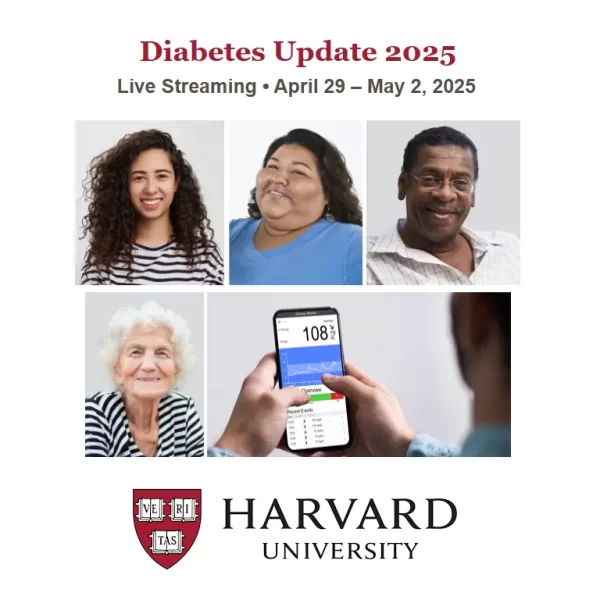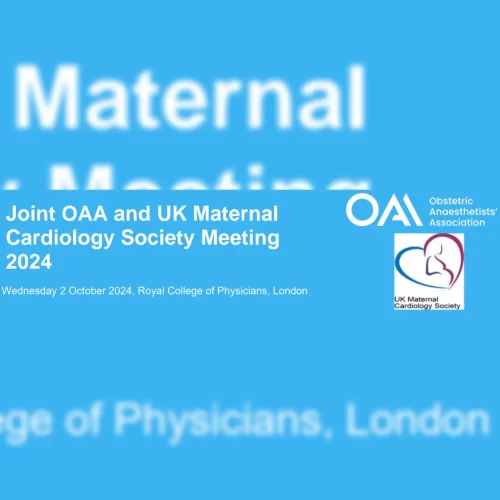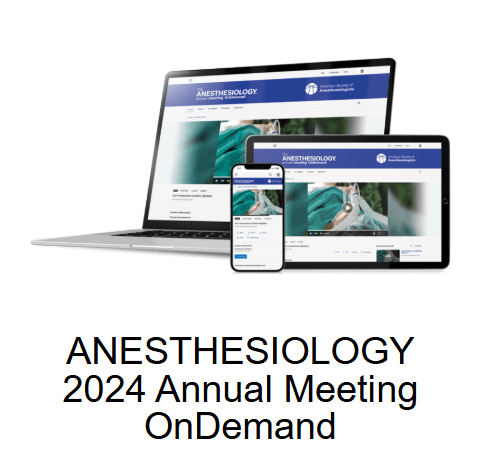Harvard Diabetes Update 2025
Diabetes Update will be held online this year, using live streaming, electronic Q&A, and other remote learning technologies.
All course content is in English. This product is shared via a Google Drive download link, so please provide your correct Gmail address when ordering. Please note that this course does not include CME points or certificate.
Training to meet the challenges of diabetes care
At a time when our diabetes knowledge and treatment options have advanced so much, why do clinical outcomes remain suboptimal, with so many patients unable to achieve good control of their disease?
The answer is rooted in four challenges:
-
Keeping pace with rapidly advancing clinical options for diabetes care:
-
Therapies
-
Technologies
-
Lifestyle medicine interventions
-
-
Designing comprehensive therapeutic interventions based on frequent diabetes-associated diseases and complications.
-
Accounting for a patient’s unique biological, psychological, social, financial, educational, and cultural factors.
-
Overcoming structural health care barriers that require clinical strategies to fit within a particular mold.
This course is designed to equip clinicians to meet these challenges, providing practical, evidence-based approaches to optimize care for your patients.
Strategies, updates and best practices for state-of-the-art diabetes care.
This program affords you the opportunity to learn from leaders in the field of diabetes who are distinguished for their outstanding teaching, knowledge, and innovations in clinical care.
Participants can rely on this program for comprehensive education to ensure state-of-the-art treatment. Coverage includes:
-
Designing more effective treatment plans.
-
Current anti-diabetes medications and how to use them.
-
Diagnosis of different types of diabetes.
-
Utilization of recent technology advances in diabetes care.
-
Optimizing care for people with obesity.
-
Assessing and treating cardiovascular and renal complications.
-
Guiding patients on physical activity and medical nutrition.
-
Management of hypertension and dyslipidemia.
-
Addressing low engagement in therapy.
New data and practice guidelines for diabetes care
-
The newest data on the identification of different types of diabetes.
-
The latest scientific information on how to reduce cardiovascular and renal disease risk in patients with type 2 diabetes.
-
New guidelines and practice recommendations for nutrition and physical activity coupled with instruction to incorporate them into your current approaches to diabetes care.
-
Criteria to navigate the controversial data related to some anti-diabetes medications.
-
Medical vs. surgical management of obesity.
-
New technologies in diabetes care: updates and implications for day-to-day care.
-
Research breakthroughs.
-
Tips and tricks for navigating barriers within health care systems.
Assessment and treatment of complications from diabetes
The 2025 program provides education to assess and treat:
-
Cardiovascular disease
-
Congestive Heart Failure
-
Renal Disease
-
Metabolic-Associated Steatotic Liver Disease
Optimizing health outcomes for diverse patient populations
This program also provides comprehensive guidance to account for biological, psychological, emotional, social, financial, and cultural factors that impact the development and progression of diabetes.
Coverage includes:
-
Racial and ethnic minorities
-
The elderly
-
People with obesity
-
Patients at high cardiovascular risk
-
Individuals with low engagement in therapy
-
Patients at low socio-economic levels
-
Subjects with low health literacy/education
-
Individuals with depression/emotional distress
-
Patients with metabolic liver disease
Program:
| Date and Time | Topic / Lecture | Speaker(s) |
| Tuesday, April 29, 2025 | ||
| 9:00 – 9:15 | Welcome and Introduction | Course Directors |
| Identifying Various Types of Diabetes in Clinical Practice | ||
| 9:15 – 9:40 | Is It Type 1 Diabetes, Type 2 Diabetes, or Something Else? | Miriam Udler, MD, PhD |
| 9:40 – 10:05 | The Connection Between Diabetes Phenotypes and Social Determinants of Health | Jacqueline Seiglie, MD |
| 10:05 – 10:45 | Panel Discussion and Practical Recommendations | Miriam Udler, MD, PhD and Jacqueline Seiglie, MD |
| 10:45 – 11:00 | Break | |
| Medical Nutrition Management in Diabetes and Obesity | ||
| 11:00 – 11:25 | Does When You Eat Matter? Intermittent Fasting, Circadian Rhythms, and Food Order | Courtney Peterson, PhD, MSc, MA, MS |
| 11:25 – 11:50 | Current Dietary Recommendations in Diabetes and Obesity | Laura Andromalos, MS, RD, RN, CSOWM, CDCES |
| 11:50 – 12:30 | Panel Discussion and Practical Recommendations | Courtney Peterson, PhD, MSc, MA, MS and Laura Andromalos, MS, RD, RN, CSOWM, CDCES |
| 12:30 – 13:20 | Break | |
| Prescribing Exercise to Patients with Diabetes | ||
| 13:20 – 13:45 | Exercise Recommendations in Type 2 Diabetes and Obesity | Edward M. Phillips, MD |
| 13:45 – 14:10 | A Practical Exercise Session Demonstration | Jacqueline I. Shahar, MEd, RCEP, CDCES |
| 14:10 – 14:50 | Panel Discussion and Practical Recommendations | Edward M. Phillips, MD and Jacqueline I. Shahar, MEd, RCEP, CDCES |
| 14:50 – 15:00 | Break | |
| Special Lecture | ||
| 15:00 – 15:45 | Improving Diabetes Care by Addressing Patient, Health Care Professional, and Health Care System Factors | A. Enrique Caballero, MD |
| Wednesday, April 30, 2025 | ||
| 9:00 – 9:10 | Welcome, Recap, and Introduction to Day 2 | Course Directors |
| Obesity Management in the Patient with Diabetes | ||
| 9:10 – 9:40 | Health Implications of Overweight and Obesity: A Focus on Sleep Disorders | Peminda Cabandugama, MD, DABOM |
| 9:40 – 10:10 | Lifestyle Modification in Obesity: Does It Work? | Julia Lloyd, MPH, RD, CDCES |
| 10:10 – 10:50 | Pharmacological Management: What Intervention and When? | W. Scott Butsch, MD, MSc |
| 10:50 – 11:05 | Break | |
| 11:05 – 11:35 | Surgical Management of Obesity: An Update | Matthew M. Hutter, MD, MBA, MPH |
| 11:35 – 12:15 | Panel Discussion and Practical Recommendations | W. Scott Butsch, MD, MSc, Matthew M. Hutter, MD, MBA, MPH, and Julia Lloyd, MPH, RD, CDCES |
| 12:15 – 13:05 | Break | |
| Management of Traditional CV Risk Factors in Diabetes | ||
| 13:05 – 13:45 | Dyslipidemia Management in the Patient with Diabetes | Om P. Ganda, MD |
| 13:45 – 14:30 | Hypertension Management in the Patient with Diabetes | Naomi D. Fisher, MD |
| 14:30 – 15:00 | Q and A and Practical Recommendations | Om P. Ganda, MD and Naomi D. Fisher, MD |
| Special Lecture | ||
| 15:00 – 15:45 | Metabolic Dysfunction-Associated Steatotic Liver Disease (MASLD): A 2025 Vision | Kenneth Cusi, MD |
| Thursday, May 1, 2025 | ||
| 9:00 – 9:10 | Welcome, Recap, and Introduction to Day 3 | Course Directors |
| Cardiovascular Disease in the Patient with Diabetes | ||
| 9:10 – 9:40 | Coronary Artery Disease: Evaluation and Management | Jorge Plutzky, MD |
| 9:40 – 10:10 | Heart Failure in the Patient with Diabetes: An Update | Deepak L. Bhatt, MD, MPH, MBA |
| 10:10 – 10:45 | Q and A and Practical Recommendations | Jorge Plutzky, MD and Deepak L. Bhatt, MD, MPH, MBA |
| 10:45 – 11:00 | Break | |
| Renal Disease in the Patient with Diabetes | ||
| 11:00 – 11:25 | Evaluation of Chronic Kidney Disease | Katherine R. Tuttle, MD |
| 11:25 – 11:50 | Prevention and Management of Chronic Kidney Disease | Janani Rangaswami, MD, FACP, FCRS, FAHA |
| 11:50 – 12:30 | Q and A and Practical Recommendations | Katherine R. Tuttle, MD and Janani Rangaswami, MD, FACP, FCRS, FAHA |
| 12:30 – 13:20 | Break | |
| Technology Advances in Diabetes Care | ||
| 13:20 – 13:50 | Continuous Glucose Monitoring: A 2025 Vision | Devin Steenkamp, MD |
| 13:50 – 14:20 | Insulin Pumps, Closing the Loop: Where Do We Stand? | Diana Isaacs, PharmD, BCPS, BCACP, BC-ADM, CDCES, FADCES, FCCP |
| 14:20 – 14:50 | Q and A and Practical Recommendations | Devin Steenkamp, MD and Diana Isaacs, PharmD, BCPS, BCACP, BC-ADM, CDCES, FADCES, FCCP |
| 14:50 – 15:00 | Break | |
| Special Lecture | ||
| 15:00 – 15:45 | Artificial Intelligence in Diabetes Care: Fact or Fiction? | James Flory, MD |
| Friday, May 2, 2025 | ||
| 9:00 – 9:10 | Welcome, Recap, and Introduction to Day 4 | Course Directors |
| Pharmacological Management of Type 2 Diabetes: Traditional Medications | ||
| 9:10 – 9:50 | Traditional Medications (Biguanides, SUs, TZDs, Alpha-Glucosidase Inhibitors) | Deborah J. Wexler, MD, MPH |
| 9:50 – 10:30 | Insulin Therapy in the Patient with Diabetes | Guillermo E. Umpierrez, MD, CDCES, FACE, MACP |
| 10:30 – 11:10 | Q and A and Practical Recommendations | Deborah J. Wexler, MD, MPH and Guillermo E. Umpierrez, MD, CDCES, FACE, MACP |
| 11:10 – 11:20 | Break | |
| Special Lecture | ||
| 11:20 – 12:00 | Lack of Adherence to Therapy and Clinical Inertia: How to Overcome Them | Anne Peters, MD |
| 12:00 – 13:00 | Break | |
| Pharmacological Management of Type 2 Diabetes: Newer Medications | ||
| 13:00 – 13:35 | SGLT-2 Inhibitors: An Update | Silvio E. Inzucchi, MD |
| 13:35 – 14:10 | GLP-1 Receptor Agonists: An Update | Lee-Shing Chang, MD |
| 14:10 – 14:45 | Mineralocorticoid Receptor Antagonists: Role in Diabetes Care | Romela Petrosyan, MD |
| 14:45 – 15:30 | Q and A and Practical Recommendations | Silvio E. Inzucchi, MD, Lee-Shing Chang, MD, and Romela Petrosyan, MD |
| 15:30 – 15:40 | Closing Remarks | Course Directors |





Reviews
There are no reviews yet.